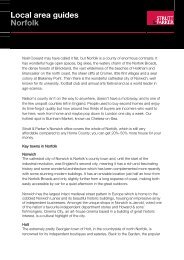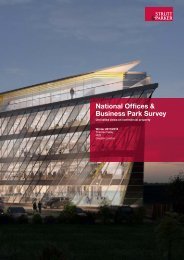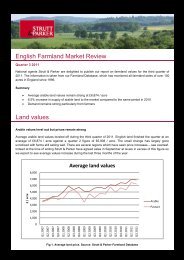Download PDF - Strutt & Parker
Download PDF - Strutt & Parker
Download PDF - Strutt & Parker
- No tags were found...
You also want an ePaper? Increase the reach of your titles
YUMPU automatically turns print PDFs into web optimized ePapers that Google loves.
Background & TechnologyMobile telephony is a vital part of the UK economy. According to Ofcom, in 2008 86% of adults owned amobile phone; that figure now stands at 91% and there are approximately 1.3 mobile phones per head ofpopulation.Mobile operators’ retail revenues are in excess of £15 billion per annum. Mobile voice call minutes are inexcess of 125 billion minutes per annum and now account for half of the total voice call minutes in the UK.At the end of 2010, 15% of all adults lived in homes with a mobile phone and no landline; in 2006 it was only4%. Whilst the average mobile connection has increased to 1.3 per person, the number of fixed lines ‘landlines’ fell yet again to 33.4million.Across the UK, 96% of people now live in postcode districts with at least 90% 2G coverage from one or moreoperators. This figure increases to 99% in England but is lower in Wales, Scotland and Northern Irelandreflecting lower population densities and terrain limitations. 3G coverage is relatively similar.The smartphone has taken off. In the two years to March 2010 the number of people in the UK accessing theinternet from mobile devices more than doubled. At the end of 2010 there were 33.1 million 3G mobileconnections, 6.2 million more than in 2009. Now over 4.8 million people access mobile broadband via alaptop and dongle and half of the population own a smartphone. The increasing use of mobile broadbandservices via these devices resulted in a 67% increase in data transferred over the UK’s mobile networks in2010. Smartphones require a denser pattern of radio masts and therefore a greater capital investment.Last year the government announced a £150 million cash injection to fill the aptly named ‘not spots’.Allocation of this funding is expected to include the development of new broadband carrying telecomsinfrastructure in areas of little or no existing service. Additionally, Ofcom has outlined an ambitious proposal toextend 4G coverage to at least 98% of the population. Furthermore, the emerging 4G technology promisessignificantly faster wireless broadband services with speeds being up to 230% faster than the currentnetworks and expected to become 450% faster by 2020.Notwithstanding this growth, operators are feeling the pinch. New proposals from Ofcom for a 37% cut inconsumer charges in real terms over 4 years will affect operators’ future revenue. UK margins remain belowthe level that operators enjoy elsewhere in the EU.According to the Mobile Operators Association (and notwithstanding the decommissioning of some sites) thenumber of sites across the UK rose to 52,500 in 2010 from 51,300 base stations at the start of 2009 (up from48,000 at the end of 2006). Two-thirds of these are installed on existing buildings or structures.Operators are increasingly working in conjunction with each other. The first such successful collaborationarose in December 2007 with a joint venture between H3G and T-Mobile who, under Mobile BroadbandNetwork Ltd (MBNL), consolidated their networks combining hardware and infrastructure to operate a singlenetwork under joint names.In July 2010 T-Mobile formed a joint venture with Orange. T-Mobile (company no 023821610) renamed itselfEverything Everywhere Ltd. Orange remained a seperate legal entity (company number 021781917) and isowned by the former T-Mobile company through an offshore holding company.In 2009 O2 and Vodafone established a joint team called Cornerstone to share structures and consolidatenetworks. As a consequence, O2 and Vodafone work closely together.This has resulted in there being effectively two, rather than five organisations, operating, planning and buildingmobile telephone networks across the UK.3STRUTT & PARKERTELECOMMUNICATIONS SURVEY 2012















